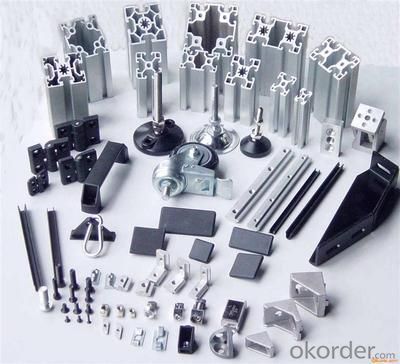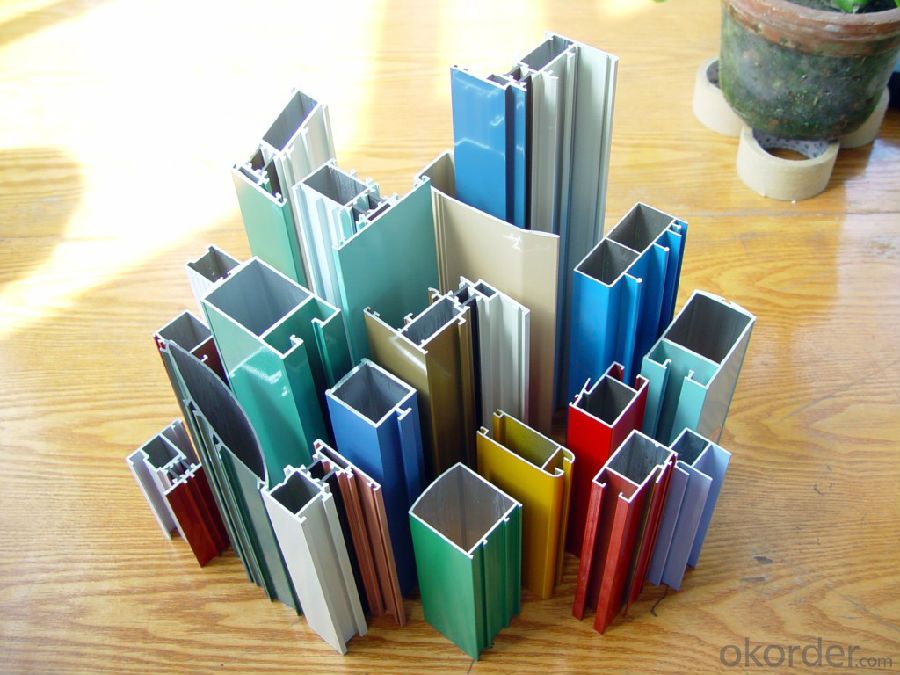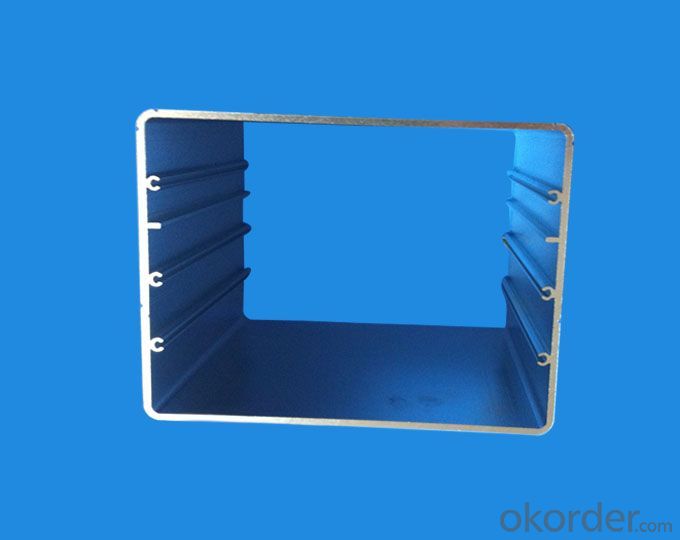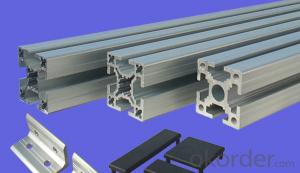Aluminium Profile with PVDF Coated and Color Coated
- Loading Port:
- Shanghai
- Payment Terms:
- TT OR LC
- Min Order Qty:
- 15 m.t.
- Supply Capability:
- 2000 m.t./month
OKorder Service Pledge
OKorder Financial Service
You Might Also Like
Item specifice
Structure of Aluminium Profile with PVDF Coated and Color Coated Description:
Coated aluminum coil/sheet are of a wide range of colors, which gives wonderful appearance no matter in residential and commercial constructions of great exhibition centers.
The coated aluminum coil/sheet have been widely used in the fields of construction and decoration( garage doors, ceiling etc.), electronic appliances, lighting decoration, air-condition air pipes, sandwich panels and drainages etc.
Main Features of the Aluminium Profile with PVDF Coated and Color Coated:
1) High flexibility
2) Impact resistance
3) Excellent weather-proof durability
4) Anti-ultraviolet
5) High erosion resist
Images of the Aluminium Profile with PVDF Coated and Color Coated:



Aluminium Profile with PVDF Coated and Color Coated Specification:
Alloy | A1100,A3003,A1050,A8011 etc |
Temper | H16,H18,H24 |
Thickness | From 0.024mm to 1.2mm |
Width | Standard width:1240mm |
Special width:1300mm,1520mm,1570mm,1595mm | |
Diameter | Standard dia:1200mm |
Interior dia:150mm,405mm,505mm | |
Weight | 2.5 T/coil,3.0 T/coil |
Coating | PE, PVDF, AC |
Surface | Embossed, mill finish, coated |
Color | AS to code RAL |
Gloss | 10-90%(EN ISO-2813:1994) |
Coating Thickness | PE: more than 18 micron |
PVDF: more than 25 micron | |
Coating Hardness (pencil resistance) | More than 2h |
Coating adhesion | 5J(EN ISO-2409:1994) |
Impact Resistance | No peeling or cracking(50 kg/cm,ASTMD-2794:1993) |
Flexibility (T-bend) | 2T |
MEK resistance | More than 100 |
FAQ:
a.What is monthly capacity
---CNBM is one stated own company and our monthly capacity is about 2000tons.
b. Now which countries do you export your goods?
---Now we export to South East Asia,Africa, North America,South America ect.
- Q:Can aluminum coils be used for radiation shielding?
- Yes, aluminum coils can be used for radiation shielding. Aluminum is often used as a shielding material due to its high atomic number and excellent attenuation properties, which effectively block and absorb radiation. It is commonly used in various industries, including medical, nuclear, and aerospace, for shielding against different types of radiation such as X-rays and gamma rays.
- Q:How do aluminum coils perform in saltwater environments?
- Aluminum coils perform exceptionally well in saltwater environments due to their natural resistance to corrosion. Unlike other metals, aluminum forms a protective oxide layer when exposed to saltwater, creating a barrier that prevents further corrosion. This oxide layer acts as a durable and long-lasting shield against the harsh effects of saltwater, ensuring the longevity and performance of aluminum coils in marine applications. Additionally, aluminum coils are lightweight and possess high thermal conductivity, making them popular choices for heat exchangers and condensers in saltwater-based cooling systems. Overall, aluminum coils are highly reliable and efficient in saltwater environments, making them a preferred choice for various marine applications.
- Q:How are aluminum coils protected from corrosion?
- Various methods and coatings can be utilized to safeguard aluminum coils from corrosion. One prevalent technique involves anodizing, where the coils are immersed in an electrolyte solution and subjected to an electric current. This process generates a thick oxide layer on the aluminum surface, providing exceptional resistance against corrosion. Another approach entails applying a protective coating to the aluminum coils. These coatings, which can be organic or inorganic (such as polyester, epoxy, or polyvinylidene fluoride), act as a barrier, effectively preventing moisture and corrosive substances from reaching the surface. Additionally, the use of sacrificial coatings can be employed for aluminum coil protection. This technique involves applying a layer of a more reactive metal, like zinc or magnesium, onto the aluminum surface. By sacrificing itself, this coating corrodes instead of the aluminum, effectively shielding it from corrosive elements. To prevent corrosion, regular cleaning and maintenance are crucial. It is imperative to routinely eliminate accumulated dirt, debris, and corrosive substances from the coil's surface in order to maintain its corrosion resistance. By combining anodizing, protective coatings, sacrificial coatings, and proper maintenance, the longevity and performance of aluminum coils are effectively preserved, ensuring their optimal protection against corrosion.
- Q:Can aluminum coils be used in food processing applications?
- Food processing applications can utilize aluminum coils, as they offer a range of advantages. Aluminum is a widely used and highly adaptable material in the food industry due to its various benefits. Aluminum coils are lightweight, durable, and possess excellent thermal conductivity, which makes them suitable for applications requiring efficient and uniform heat transfer. When it comes to food processing, aluminum coils are commonly employed in equipment such as heat exchangers, evaporators, and refrigeration units. These coils help to cool, heat, or maintain the temperature of different food products during their processing, storage, or transportation. The exceptional thermal conductivity of aluminum ensures that heat is evenly dispersed, thereby aiding in the preservation of food quality and flavor. Furthermore, aluminum is a non-toxic and non-reactive metal, meaning it has no adverse effects on the taste or composition of the processed food. It is also naturally resistant to corrosion, ensuring that the coils do not contaminate the food and can be easily cleaned and maintained. In addition, aluminum is an environmentally friendly and recyclable material, aligning with the increasing demand for sustainable practices in the food industry. Its lightweight nature also contributes to energy efficiency and reduced transportation expenses. In conclusion, aluminum coils are a reliable, efficient, and safe choice for food processing applications. They meet the strict requirements of the industry while ensuring the quality and safety of the processed food.
- Q:Can aluminum coils be used in the production of architectural panels?
- Yes, aluminum coils can be used in the production of architectural panels. Aluminum is a popular material for architectural panels due to its lightweight, durability, and versatility. Aluminum coils can be easily shaped, cut, and formed into various panel designs, making them suitable for a wide range of architectural applications.
- Q:Can aluminum coils be used for signage purposes?
- Yes, aluminum coils can be used for signage purposes. Aluminum is a versatile and lightweight material that is commonly used in the signage industry. It has excellent corrosion resistance, making it suitable for both indoor and outdoor applications. Aluminum coils can be easily cut and formed into various shapes and sizes, allowing for customizable signage designs. Additionally, aluminum is highly durable and can withstand harsh weather conditions, making it a long-lasting option for signage. The coils can be painted or coated with different finishes to achieve the desired aesthetic appeal, while also providing protection against fading and scratching. Overall, aluminum coils are a popular choice for signage purposes due to their versatility, durability, and aesthetic appeal.
- Q:what language did Aluminum and Uranium originate from ? Who or what were they named for ?
- The ancient Greeks and Romans used alumen (alum, potassium aluminium sulfate, K2Al6(OH)12(SO4)4) in medicine as an astringent, and as a mordant in dyeing. Alum was exported from ancient Greece and Italy. In 1761 the French chemist Louis-Bernard Guyton de Morveau (1737-1816) proposed the name alumine for the base in alum. Guyton de Morveau was instrumental in setting up a standardised system for chemical nomenclature and often collaborated with Antoine Lavoisier, who in 1787, suggested that alumine was the oxide of a previously undiscovered metal. In 1808, Sir Humphry Davy (1778-1829) did experiments for the decomposition of alumine, silex, zircone, and glucine. He failed to isolate the metals in these, as he reported in his paper for the Royal Society of London on 30 June 1808, but he suggested names for the metals (note) Cf. Silicium, Zirconium, and Beryllium (Glucium) Thus he proposed the name alumium for this still undiscovered metal and later agreed to change it to aluminum. Shortly thereafter the name aluminium was adopted to conform with the -ium ending of most elements. Uranium was named by its discoverer German chemist Martin Klaproth, after the last planet to have been discovered Uranus.
- Q:Foshan where there are high-quality aluminum and aluminum rolls for sale?
- Hexi Industrial Zone, Yanbu District, Nanhai District, Foshan
- Q:What is the difference between pre-painted and natural aluminum coils?
- There are two types of aluminum coils used in various industries: pre-painted and natural. The surface finish is the main distinguishing factor between these two types. Pre-painted aluminum coils are coated with paint or a protective coating before delivery. This coating is applied in a controlled environment, ensuring a uniform and durable finish. The advantages of pre-painted coils include increased resistance to corrosion, improved appearance, and better ability to withstand weather conditions. They also offer a wide range of color options, which makes them suitable for architectural applications where color matching is important. On the other hand, natural aluminum coils remain untreated and maintain their original metallic appearance. These coils are commonly used in applications where the natural aluminum finish is desired, such as in the production of consumer electronics, automotive parts, and other industrial products. Natural aluminum coils are known for their excellent thermal conductivity, lightweight nature, and high strength-to-weight ratio. In conclusion, the difference between pre-painted and natural aluminum coils lies in their surface finish. Pre-painted coils have a protective layer of paint, providing improved resistance to corrosion, better appearance, and color choices. Natural aluminum coils, on the other hand, retain their original metallic appearance and are often preferred in applications where the natural aluminum finish is desired.
- Q:Why there is always impression and indentation on the backup roller of aluminum coil rolling mill with 4 rollers.
- It is either the external or the bearing problem in designing and installing.
1. Manufacturer Overview |
|
|---|---|
| Location | |
| Year Established | |
| Annual Output Value | |
| Main Markets | |
| Company Certifications | |
2. Manufacturer Certificates |
|
|---|---|
| a) Certification Name | |
| Range | |
| Reference | |
| Validity Period | |
3. Manufacturer Capability |
|
|---|---|
| a)Trade Capacity | |
| Nearest Port | |
| Export Percentage | |
| No.of Employees in Trade Department | |
| Language Spoken: | |
| b)Factory Information | |
| Factory Size: | |
| No. of Production Lines | |
| Contract Manufacturing | |
| Product Price Range | |
Send your message to us
Aluminium Profile with PVDF Coated and Color Coated
- Loading Port:
- Shanghai
- Payment Terms:
- TT OR LC
- Min Order Qty:
- 15 m.t.
- Supply Capability:
- 2000 m.t./month
OKorder Service Pledge
OKorder Financial Service
Similar products
New products
Hot products
Related keywords




























